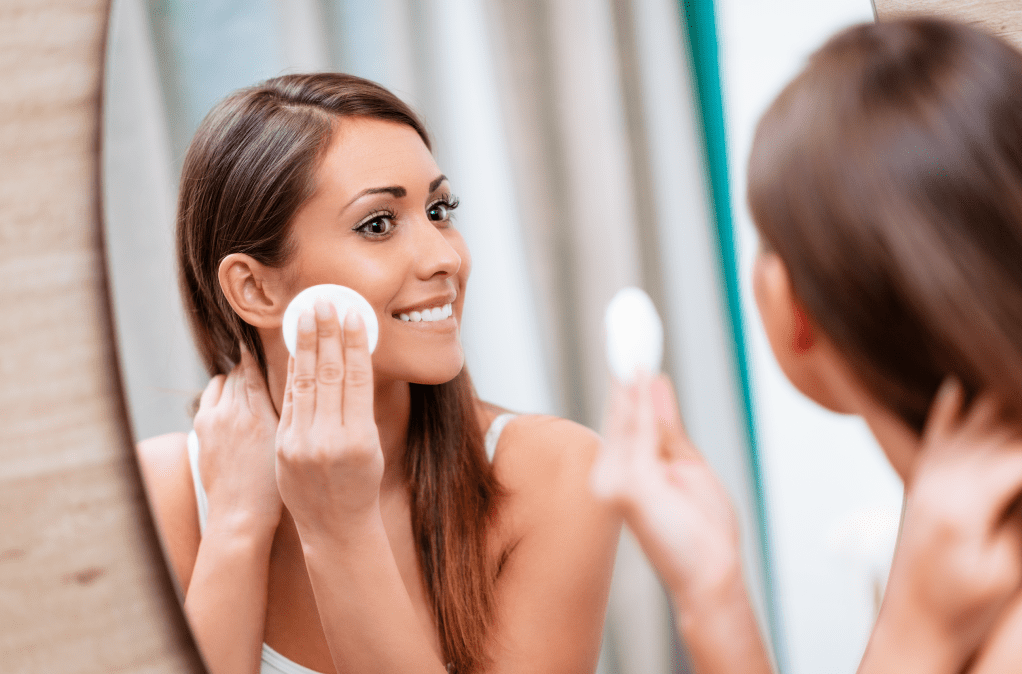Feeling good and looking good are two of the main goals of people trying to improve their diets by adding healthy nutritional supplements and skin treatments. Scientists have studied many of the ingredients commonly found in the skin care marketplace to determine exactly what benefits each of them can provide. Those studies have also raised questions about both the effectiveness and safety of some chemicals used in skin care products and supplements. [This article, “The Skinny On Healthy Skin Care” was originally published in HealthXWire]
The bottom line recommendation for a healthy skin care regimen remains the same as the recommendation for overall good health – stick closely to products made from all natural ingredients and avoid the additives, dyes and preservatives manufactured in chemistry labs. Use those products as directed, and you may be able to hold onto supple, wrinkle-free skin for years to come.
What You Need: Vitamins, Minerals And (Good) Fats
The best place to start your skin care regimen is by looking at your diet. Researchers have identified the foods that contain the highest concentration of nutrients needed for healthy, radiant skin. Among the recommended foods are avocados, dark green vegetables, eggs, extra virgin olive oil, fatty fish (such as salmon, sardines and tuna), flaxseeds and legumes.
While these foods provide the best sources of the building blocks required for healthy skin, many people find that they need more of the nutrients than they are able to get through their regular diet. This is where supplements can make a big difference in a person’s outward and inward health. Some important ingredients to look for in a skin care supplement are:
Each of these nutrients has a specific role to play in the maintenance of healthy skin. The fats, for example, help prevent skin from getting dry and wrinkled and help it stay moist and flexible. Omega-3 helps build cellular walls and fights against other chemicals that may permit the growth of skin cancers. Amino acids are among the antioxidants that protect the skin from ultraviolet rays. Vitamin A is also an antioxidant that offers some protection from sunburn, and it helps prevent dry and itchy skin. Vitamins C and E serve similar roles, and studies have shown they may lower the chance of a person developing skin cancer. If the skin doesn’t get enough zinc, it may develop an itchy rash that won’t respond to simple treatments such as creams and moisturizers.
What You Don’t Need, Part 1: Parabens
Parabens are a group of related chemicals that are often used as preservatives in cosmetic products. Their main function is to prevent the growth of harmful bacteria and mold in those products. The word “parabens” may not be on the list of ingredients, but they can be recognized by their scientific names. The most commonly used parabens are methylparaben, propylparaben, butylparaben, and ethylparaben.
Scientists with the Food and Drug Administration are reviewing studies into the safety of parabens. Although the FDA says it does not have evidence showing that these chemicals as they are used in cosmetics have an effect on human health, it is looking into several issues.
First, what do published studies show about the possible hazards of parabens when used in real life? Next, if there are paraben-related health effects that are scientifically supported and documented, how do these effects relate to the use of parabens in cosmetics? And finally, do the different kinds of parabens act the same or differently in the human body?
The FDA’s website says the agency will continue to evaluate new data about parabens. “If we determine that a health hazard exists, we will advise the industry and the public, and will consider the agency’s legal options under the authority of the FD&C Act to protect the health and welfare of consumers,” the website states.
What You Don’t Need, Part 2: Sulfates
Sulfates are the chemicals that put the bubbles and lather in many personal cleaning products such as soaps and shampoos. They are formed when sulfuric acid reacts with another chemical, and some of the common forms found in personal care products are sodium lauryl sulfate and sodium laureth sulfate. Sources for these sulfates can either be plant-based, such as coconut and palm oil, or petroleum products.
Although no serious health threats from sulfates have been scientifically proven so far, these compounds are controversial for several reasons. The first complaint is that they can irritate eyes, lungs and skin. Next, they are sometimes contaminated during the manufacturing process with a chemical known to cause cancer in laboratory animals. Environmentalists question the use of palm oil because of the destruction of tropical rainforests for palm tree plantations, and animal rights activists complain that many of the products containing sulfates are tested on animals to measure the level of irritation they cause to the eyes, lungs and skin.
What You Don’t Need, Part 3: Phthalates
Phthalates are chemicals commonly used in cosmetics, personal care products and other consumer goods. Their main purpose is to make those products more durable and less likely to break down when they come into contact with heat or pressure. According to the Campaign for Safe Cosmetics, phthalates have been linked to endocrine disruption, developmental and reproductive toxicity, and cancer. They have been banned from cosmetics in the European Union, but still remain legal in U.S. products.
Common forms of phthalates are called DEP, DBP and DEHP. The first of those may be in a product but listed only as a “fragrance” under a loophole in FDA regulations. The CSC says that loophole makes it difficult to determine how widespread the use of phthaletes is in skin care products, and that leaves consumers in the dark if they are trying to avoid this substance.

Nature’s Way To Great Healthy Skin Care
The safest way to get needed nutrients while avoiding potentially dangerous additives is to look for organic and all-natural products for skin care and overall health supplements. Many companies have voluntarily foresworn the use of parabens, sulfates and phthalates, and they often promote this fact as part of their marketing campaigns.
Luma By Laura is a boutique cosmetic maker based in Florida that is dedicated to making skin care products and nutritional supplements that contain all natural ingredients and none of the questionable ingredients. All of their products are manufactured with as many locally sourced ingredients as possible and comply with Good Manufacturing Procedures.
None of their products are tested on animals, and they are FDA registered. The company was founded by Mike Gonzales and his sister Mercedes three years ago; he’s responsible for the dietary supplements and she’s in charge of the cosmetic products/
“When we started, we wanted to source our products in U.S., and we wanted to make sure our products were of high quality,” says Gonzales. “The ingredients really do matter. There are companies out there making products with inferior ingredients that can cause rashes and other health problems.”
Getting The Straight Scoop
Gonzales and others say that consumers are becoming better educated about the products they are using. Instead of just looking for supplements and skin care products that make the most promises, these customers are reading labels, comparing ingredients, poring over health-related blogs, and talking to friends who have tried different products. Those are the best kind of customers to make and keep, says Gonzales.
“Our customer base is composed of men and women interested in improving their health and appearance,” he says. “It’s definitely the people who really want to take care of themselves in a more holistic, natural way.”
An excellent source of unbiased information is the website of the Food and Drug Administration, but even there buyers still have to beware. The laws that govern the FDA do not give it the authority or responsibility to test and evaluate new products and ingredients before they are sold to the public. The FDA does, however, have the power to investigate complaints about products from consumers, and it oversees the claims made by marketers as well as the safety and purity of the manufacturing process.
The FDA also serves as a clearing house for vital information about products and ingredients used in a variety of consumer products. Another important repository of health information is controlled by the National Institutes of Health, which oversees the PubMed and MEDLINE websites. All of these resources are helping consumers stay educated about the chemicals they are putting on and in their bodies.
Disclaimer
Important Note: The information contained in this article is for general informational purposes only, and should not be construed as health or medical advice, nor is it intended to diagnose, prevent, treat, or cure any disease or health condition. Before embarking on any diet or program of nutritional supplementation, it is advisable to consult your healthcare professional to determine its safety and probable efficacy in terms of your individual state of health
Table of Contents


